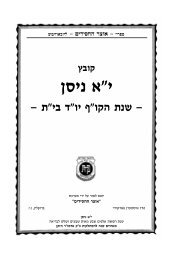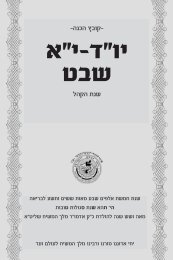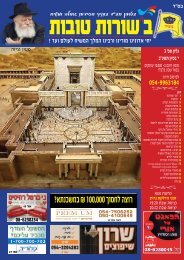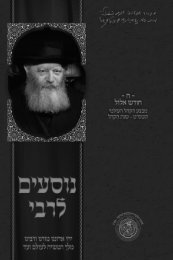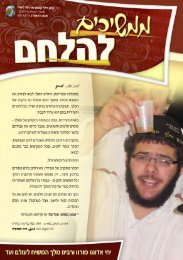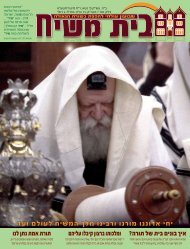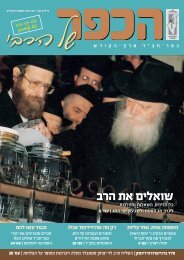You also want an ePaper? Increase the reach of your titles
YUMPU automatically turns print PDFs into web optimized ePapers that Google loves.
23____________________________________________________Notes:[1] There are many sources that speak of the great soul-elevation accomplished through givingcharity in honor of a deceased person. Midrash, Rabbeinu Bachya, on Devarim, 21:8. Beis Yosef, OrachChaim, 284; 621. Bach, ad loc; Tanchumah, Hazinu; Kaftor U’Perach, 44; Ramah, 621:4; Yoreh Deah,249:16; Kav HaYashar, 86.[2] Some sources speak about building a mausoleum. Yerushalmi, Shekalim, 2, 5; SeferHaChasidim, 738.[3] Erecting a gravestone or monument creates a seat for the makifim or transcendent levels of theperson’s soul. Likutei Torah AriZal, Parshas VaYechi, p. 118; Mishnas Chassidim, Meseches GemilusChassadim, 3:13; Reb DovBer of Chabad: Maamor Hishtatchus, 2. In the Gemara, the headstone is referredto as Nefesh, as the soul permeates its space. Rabbi Pinchas of Koritz, Aimrei Pinchas, Likutim, 41, p. 223.[4] One should study Torah in honor of the deceased. Yevamos, 122a, Rashi, in the name of theGaonim.[5] One should recite the Haftara in the merit of a deceased parent. Rama, Siman 376:6.[6] Lighting a candle during the shiva period creates joy for the soul. Ma’avar Yavok, Ma’amar 2,Chapter 15, p. 220. In general, souls receive pleasure when we light candles in their memory. RabbeinuBachya, Shemos, 25:31; Teshuvas Torah Lishmah, Siman 520. There is an established custom to light acandle every year on the date of a person’s passing. Maharshal, Siman 46; Magen Avraham, Siman 261:6;Nachalas Shiva, Siman 73; Mishnah Berurah, Hilchos Shabbas, 261:16.[7] Gehenom is experienced for, at most, twelve months. Mishnah, Ediyos, 2:10, and this is whenthe entire year unfolds and no zodiac influence can find merit for the soul. Tagmulei HaNefesh 11, p.31a;Shabbos, 33b; Zohar 1, p.107b. Some sources say that some souls must remain in gehenom for a longertime. Rosh Hashanah, 17a; Baba Metzia, 58b; Zohar II, p.150b; Zohar III, p. 220b. However, after theirextended period of cleansing, they too will enter Gan Eden. Midrash Talpiyos, Os 8, p.670. Gehenom isviewed as a sponge, which removes negativity Emek HaMelech, Shar Tikkunei Ha’Teshuvah, 1, p.15b.This is also the purpose of teshuvah Baba Metziah 58b, Tosefos; Rosh Hashanah, 17a. After an appropriatecleansing process, souls enter Gan Eden. Midrash Rabbah, Shemos, 7;4. Psikta Rabbati, 53:2. Ultimately,Gehenom itself (the experience of one’s own negativity) will become null and rendered obsolete, and allsouls will transcend the need for it. Asarah Maamoros, Maamor Chikur Din, p.302. Emek HaMelech, SharTikkunei HaTeshuvah, 3, p.17.[8] Kaddish is recited in Aramaic, the ancient language that all the Jews spoke during the periodafter the destruction of the Temple, so that everyone could understand. Tosefos, Berachos, 3a. Kol Bo, 7.Shibolei HaLeket, Siman 8. And that the Angels could not understand. Tur, Siman, 58, so there will be noKitrug/ negative adversary. Bach, ad loc.[9] The Gemara also mentions, in a story, the importance of praying for the deceased, andspecifically reciting the Kaddish. Kallah Rabsi, 2; Midrash Tanchumah, Noach; Ohr Zaruah, 2:50.[10] The Name Shalom is the Yud-Hei-Vav-Hei “knocking on” Ado-noi. Agra D’Pirka,Remez 22.




